BOKU Invention of the Year
BOKU Erfindung 2025
Konrad Domig, deputy head of the Department of Biotechnology and Food Science, is being honoured for his invention, ‘Development of a point-of-care test system for assessing the vaginal microbiota’. The idea behind the invention is a user-friendly self-test that combines a comprehensive analysis of the healthy vaginal microbiome with infection diagnostics, thereby avoiding the need for special laboratory tests. The aim is to enable easy-to-understand test interpretation of treatment options via an app, which could make a significant contribution to women's health and the prevention of premature births. The invention was developed in cooperation with MedUni Vienna – thanks to this sound scientific collaboration, the test concept clearly differs from lifestyle products.
BOKU Invention 2024
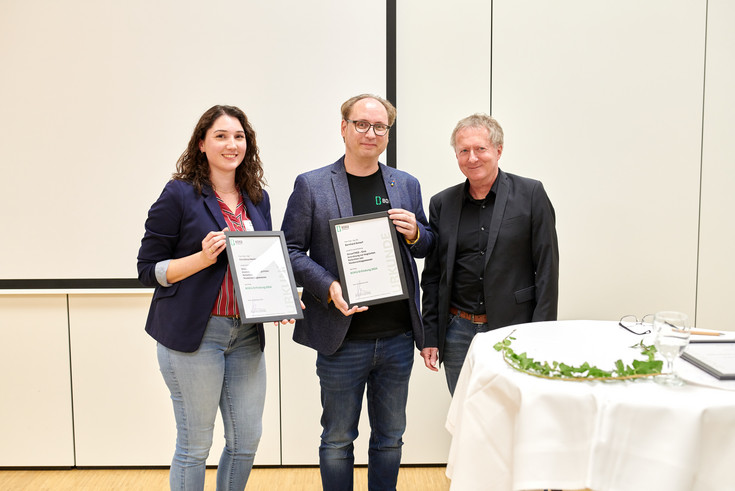
v.l.n.r. Christina Henöckl, Bernd Scharf, VR Christian Obinger
The 2024 prize went to BOKU inventors Bernhard Scharf and Christina Henöckl from the Department of Civil Engineering and Natural Hazards with their invention ‘StreetTree - An arrangement for the green retention of precipitation water’.
STREETTREE-Planter is a novel concept to create a well thought-out and cost-effective way to use urban trees even more easily and widely as an effective measure for climate change adaptation in urban areas.
BOKU Invention 2023
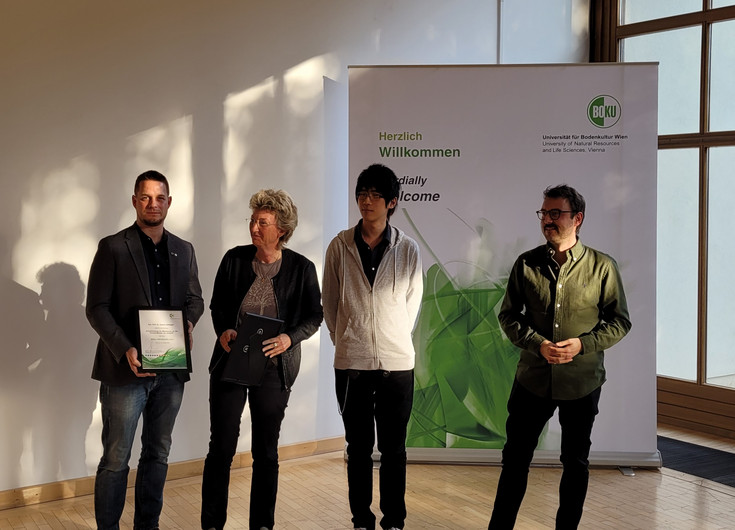
v.l.n.r Hubert Hetteger, Antje Potthast, Takaaki Goto, Robert Bischof (Lenzing AG)
The prize went to the inventors Hubert Hettegger, Antje Potthast and Thomas Rosenau from the Department of Chemistry with the technology "Complexation of metal ions before peroxide bleaching of pulp". The invention is the result of excellent scientific research in cooperation with the Wood K Plus competence centre and the company Lenzing AG. With the help of this invention, environmentally harmful complexing agents such as EDTA (ethylenediaminetetraacetic acid) can be replaced, making the processes in viscose production not only more sustainable but also more cost-effective. BOKU has successfully transferred its 45% share in the invention to co-owner Lenzing AG, which is already working on further developing the technology and increasing its technical feasibility. This invention is a perfect example of how important basic research is and that it should not be separated from applied research.
BOKU Invention 2022
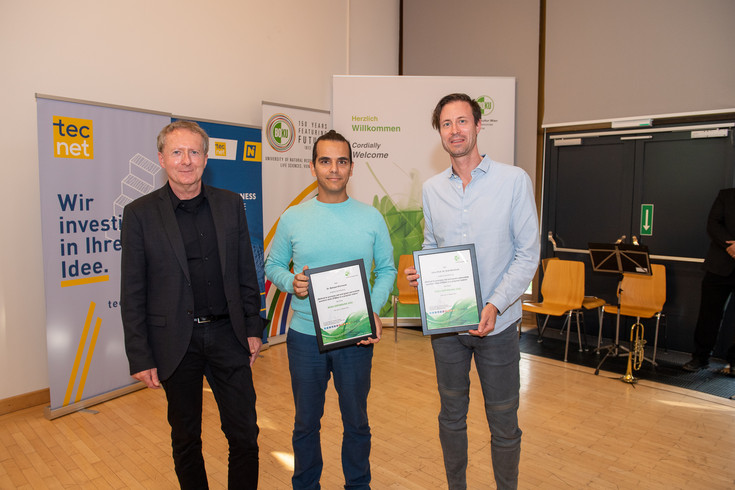
The 2022 prize winners are Erik Reimhult and Behzad Shirmardi from the Department of Nanobiotechnology for their invention "Method to process red and green perovskite quantum dots (PQDs) in a polymer matrix". The technology was licenced to the BOKU spin-off BrightComSol GmbH. The company produces the next generation of X-ray scintillators using the award-winning technology.
The prize was awarded to the inventors by VR Obinger at the autumn festival in Tulln on 12 October 2022.
BOKU Invention 2021
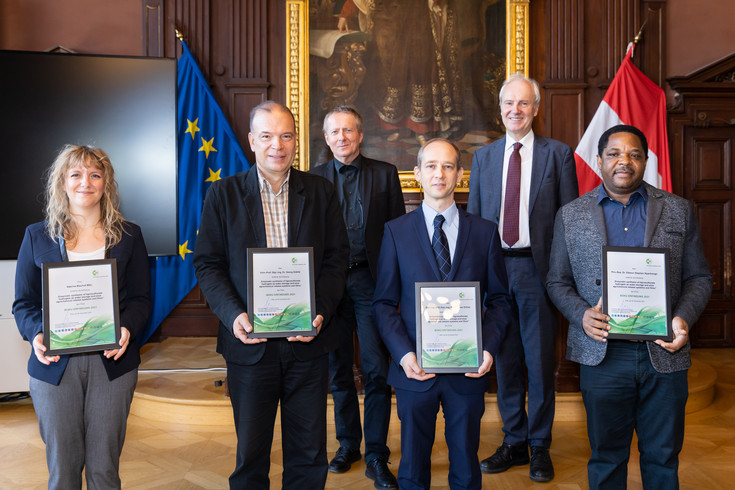
Sabrina Bischof, Georg Gübitz, Andreas Ortner and Gibson Nyanhongo convinced the jury with their invention "Enzymatic synthesis of lignosulfonate hydrogels as water storage and slow agrochemical release systems and films".
The invention is characterised not only by its innovative character, but also by its sustainability and practical relevance. Due to the wide range of possible applications, economic utilisation is possible in many areas. The technology was licenced to the BOKU spin-off Agrobiogel GmbH. Agrobiogel has qualified to represent Austria at the international Falling Walls Conference in Berlin. They successfully presented themselves to the accent jury and were also awarded one of the coveted aws- preseed grants. The production capacity in Tulln is currently being expanded, initial co-operations have been concluded and the company is preparing for its major market entry.
BOKU Invention 2020
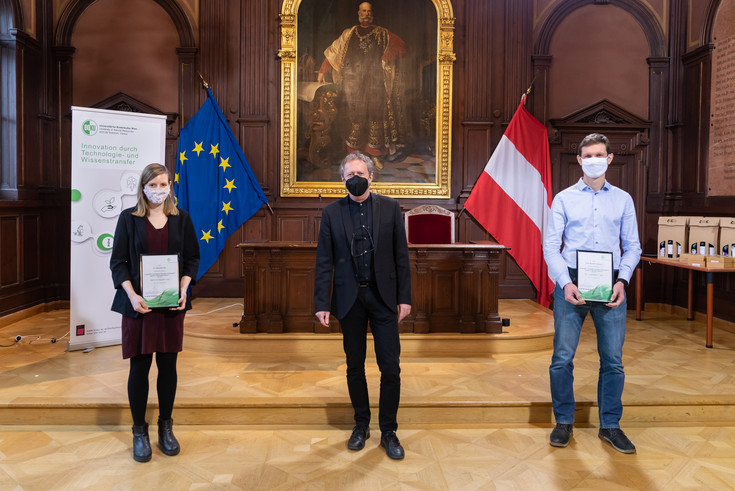
C. Zajc, C. Obinger, M. Traxlmayr
The prize went to the inventors, DI Dr Michael Traxlmayr and Dr Charlotte Zajc with the technology "A lipocalin fold-based inducible dimerisation system ("Lipocalin-Switch")".
The invention is the result of excellent scientific research in cooperation with St. Anna Children's Cancer Research, and was also made possible by the collaboration with the global biotechnology and biomedicine company Miltenyi Biotec. It is characterised in particular by the wide range of possible applications, which makes commercial exploitation possible in many areas. With the help of this invention, the safety and tumour specificity of CAR-T cell therapy will be further developed so that more effective therapies can be brought into broad clinical application and new decisive impulses for cancer therapy can be made possible worldwide.
BOKU Invention 2019
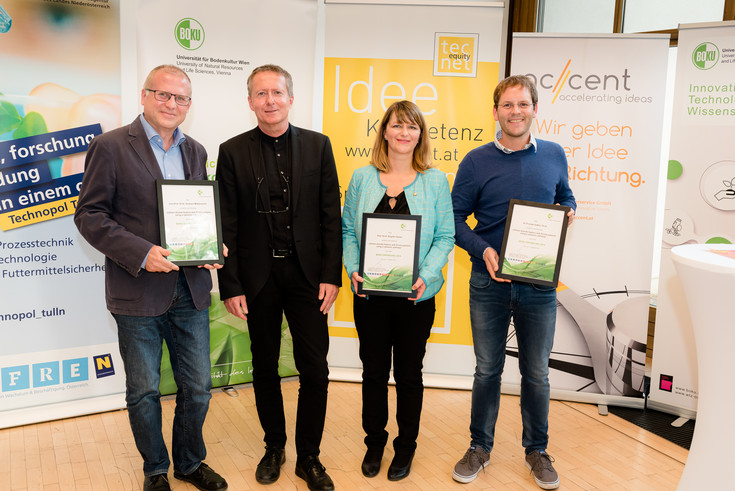
The inventors, Diethard Mattanovich, Brigitte Gasser, Michael Sauer and Thomas Gaßler, were able to convince the jury with their "CarboFeed" technology. In this project, a method was developed that makes it possible to process CO2 into an animal feed additive with the help of a new type of yeast. The aim is to utilise CO2 as a sustainable source of raw materials and it also has the environmentally friendly effect that no further agricultural land is needed for animal feed production.
